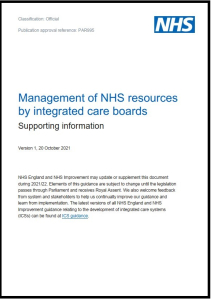Providers will map to single system for financial control
 New guidance – Management of NHS resources by integrated care boards – clarifies that any trust or foundation trust that is a ‘significant provider’ of services to an ICB will be expected to be a formal partner of that ICB. This will mean that the trust will have to agree the system’s five-year plan and annual capital plan, be able to receive ICB grants and participate in the nomination process for the ICB provider board member. Trusts that are significant providers to multiple ICBs would hold these responsibilities in each system.
New guidance – Management of NHS resources by integrated care boards – clarifies that any trust or foundation trust that is a ‘significant provider’ of services to an ICB will be expected to be a formal partner of that ICB. This will mean that the trust will have to agree the system’s five-year plan and annual capital plan, be able to receive ICB grants and participate in the nomination process for the ICB provider board member. Trusts that are significant providers to multiple ICBs would hold these responsibilities in each system.
However, for the purposes of system financial control, a provider’s revenue resources will at least initially be fully mapped to a single ICB. ‘This direct approach supports a safe transition as the new financial accountability system is established from April 2022,’ the guidance said. ‘It has the benefit of being simple and giving clarity on principal lines of financial accountability.’
The approach on capital resources is yet to be agreed as part of a wider review of operational capital.
The various NHS providers mapped to a specific ICB will have to agree how they collectively deliver a balanced financial position, including how in-year risks will be managed. In effect, a trust’s financial performance will impact directly on the system to which it is mapped. However, trusts that are formal partners with more than one ICB will have to confirm that their operational and financial plans are compatible with all relevant system plans.
Allocations to ICBs will cover budgets for most acute, ambulance, community and mental health services spending. They will also include budgets for general practice and, in some cases, other primary care services (dental, optometry and pharmacy). Further delegation of some specialised services and other direct commissioning is expected to follow from 2023/24.
ICB funding will be based on the existing needs-based formula used to derive CCG allocations. The guidance suggests this will both ensure ICBs get their fair share of resources, while also providing stability for local health economies. NHS England and NHS Improvement will not be publishing place-level allocations, which ICBs will have flexibility to set.
However, the capitation formula for ICB allocations continues to be based on general practice populations. And a new tool, still being finalised, will enable systems to understand how their system allocation could be split to a place or primary care network level.
ICBs have also been told to plan for a flat cash allowance to cover running costs. This means that funding for system administration will be the same in aggregate for 2022/23 as for current CCGs in 2021/22. Any additional costs of the transition process will have to met from existing budgets.
The new financial framework will support collaboration at place-level and at scale. The guidance, published on the Future NHS platform, also confirms that Better Care Fund arrangements will be ‘mostly unchanged’. The BCF enables the NHS and local authorities to work together using section 75 pooled budgets to commission health and social care. Local authorities will continue to contribute to the BCF and NHS England and NHS Improvement will continue to specify minimum BCF contributions by ICB for each upper tier local authority.
ICBs will also have to confirm their financial governance arrangements, including developing schemes of reservation and delegation, terms of reference for audit and remuneration committees, and conflict of interest policies. Broader best practice governance guidance has also been published.
Related content
We are excited to bring you a fun packed Eastern Branch Conference in 2025 over three days.
This event is for those that will benefit from an overview of costing in the NHS or those new to costing and will cover why we cost and the processes.